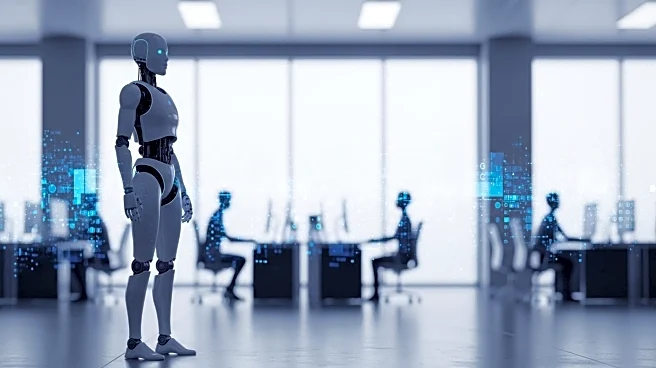What is the story about?
What's Happening?
Agentic AI, the successor to generative AI, is poised to transform workforce systems and processes, according to industry experts. Unlike its predecessor, agentic AI operates autonomously, making decisions and interacting without constant human input. This technology is already being integrated into HR functions, with over 300 startups offering AI agents for tasks such as employee self-service and HR assistance. Despite its potential, many HR teams are reportedly unprepared for this shift, which could lead to missed opportunities. Experts emphasize the need for HR professionals to champion ethical AI integration and to transition from policy enforcers to guardians of ethical AI use.
Why It's Important?
The integration of agentic AI into HR processes could significantly enhance productivity and efficiency by automating routine tasks and enabling more strategic focus. This shift is crucial as it could redefine HR's role from a transactional function to a strategic partner within organizations. Companies that successfully integrate AI are likely to lead in the AI era, aligning their business models with technological advancements. However, failure to adapt could result in HR departments becoming obsolete, losing their strategic relevance. The ethical use of AI is also a critical concern, with HR expected to lead in ensuring data privacy and bias mitigation.
What's Next?
HR professionals are encouraged to start experimenting with agentic AI tools to avoid falling behind. This involves upskilling on AI's impact and benefits, adopting a curious mindset, and treating AI as a colleague that requires support and development. Collaboration with technology teams is essential to stay informed and address concerns. As AI continues to evolve, HR's role will be pivotal in ensuring its responsible and inclusive use, potentially reshaping people practices from recruitment to employee wellbeing.
Beyond the Headlines
The ethical integration of agentic AI presents a cultural shift within organizations, requiring HR to balance technological advancement with human-centric strategies. This involves engaging employees and unions in AI development discussions to ensure transparency and trust. Companies that prioritize a people-first AI strategy are likely to see higher productivity and employee satisfaction, avoiding the pitfalls of heavy-handed AI rollouts. As AI becomes more embedded in business operations, HR's leadership in ethical AI use will be crucial in maintaining organizational integrity and employee trust.















